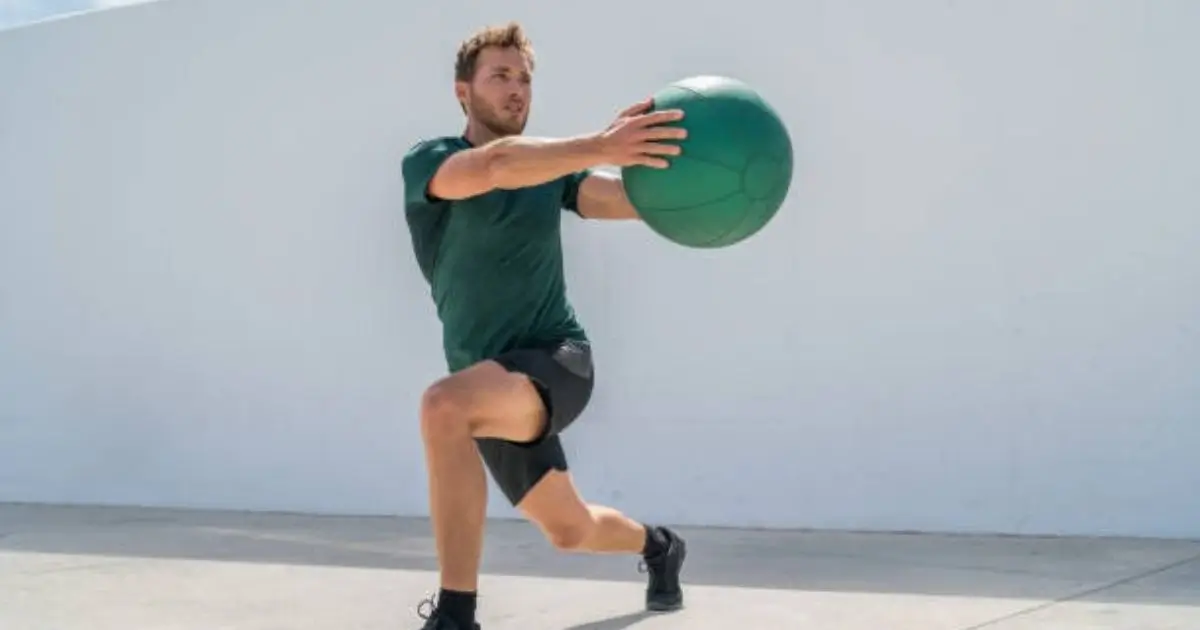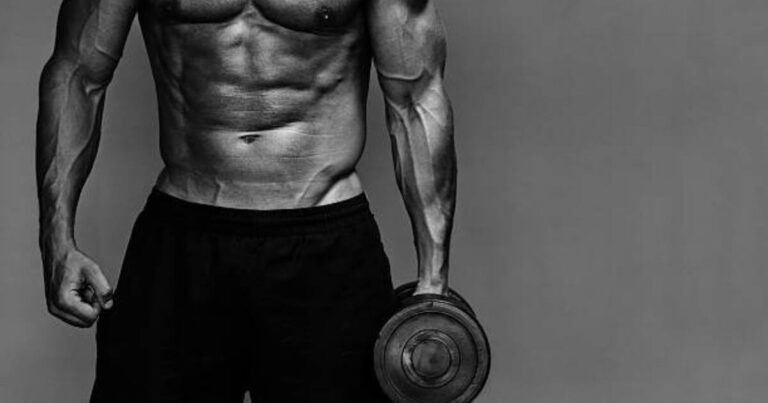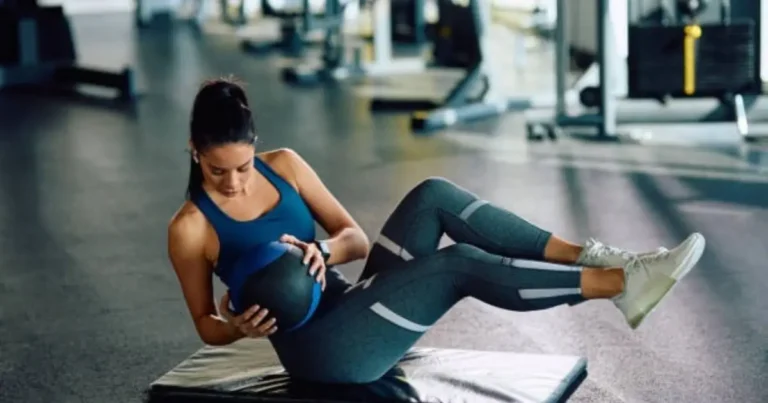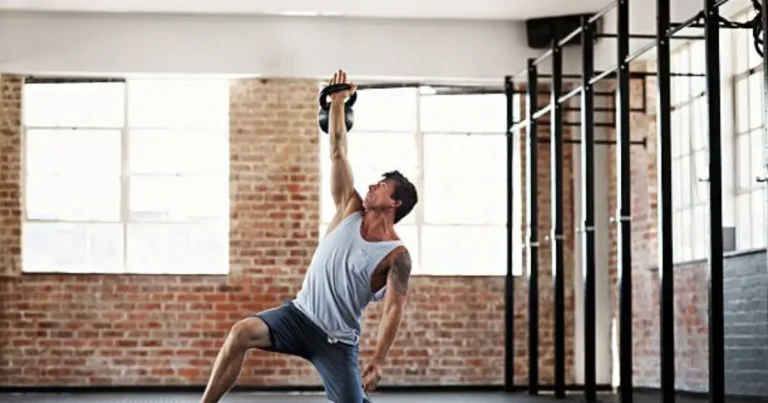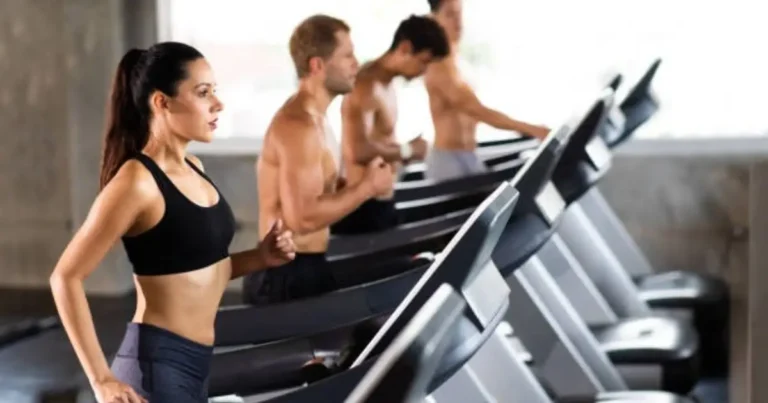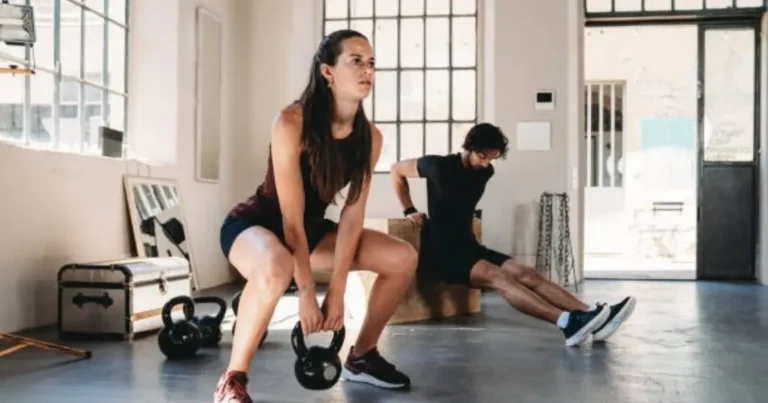Ab Workout Devices That Actually Build Core Strength
Looking to strengthen your core and develop those coveted abs? In today’s fitness market, there’s no shortage of ab workout devices promising to deliver impressive results with minimal effort. But which ones actually work? If you’ve been considering adding an ab workout device to your fitness routine, it’s crucial to separate effective equipment from gimmicky gadgets that collect dust in your closet.
This comprehensive guide explores the ab workout devices that genuinely build core strength, how to use them correctly for maximum effectiveness, and what kind of ab workout device results you can realistically expect. From simple tools like ab rollers to more complex equipment like suspension trainers, we’ll dive into the world of core training tools that fitness experts actually recommend.
Table of Contents
Understanding Your Core: More Than Just Six-Pack Abs
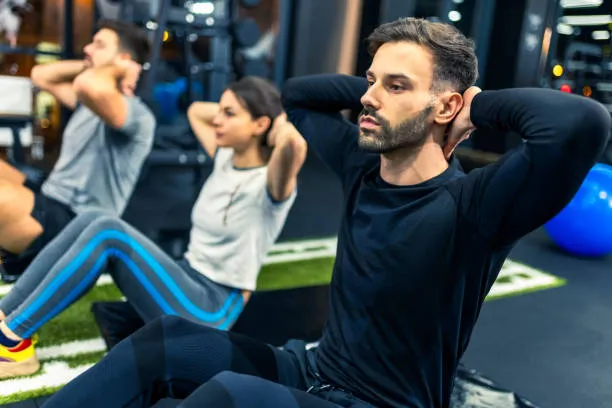
Before diving into specific ab workout devices, it’s important to understand what we mean by “core strength.” Your core includes:
- Rectus Abdominis: The “six-pack” muscles running vertically along the front of your abdomen
- Obliques: External and internal muscles along the sides of your torso
- Transverse Abdominis: Your deep core muscles that wrap around your spine and sides
- Erector Spinae: Back muscles that run along your spine
- Multifidus: Deep back muscles that support your spine
- Diaphragm, Pelvic Floor, and Hip Muscles: Often overlooked but vital for complete core function
True core strength comes from training all these muscles, not just the visible abs. The best ab workout devices target multiple core muscles simultaneously and allow progressive overload as you get stronger.
Top Ab Workout Devices That Deliver Results
Based on scientific research and expert recommendations, these ab workout devices consistently rank as the most effective for building genuine core strength:
1. Ab Roller/Wheel

This simple yet brutally effective ab workout device consists of a wheel with handles on either side.
How it works:
- Engages multiple core muscles simultaneously, particularly the rectus abdominis and transverse abdominis
- Requires significant shoulder and back strength as stabilizers
- Creates instability that forces your core to work harder
Effectiveness rating: ★★★★★
Price range: $10-$50
Best for: Intermediate to advanced fitness levels
“The ab wheel rollout is possibly the most challenging and effective core exercise you can do with a simple device. EMG studies show it activates core muscles at a higher level than most other ab exercises.” – Dr. Stuart McGill, Spine Biomechanics Expert
How to use an ab roller correctly:
- Begin on your knees on a padded surface
- Grip the handles with hands shoulder-width apart
- Engage your core by drawing your belly button toward your spine
- Slowly roll forward, extending your arms while maintaining a slight curve in your lower back
- Roll out only as far as you can maintain control
- Use core strength (not your arms) to pull yourself back to starting position
2. Suspension Trainers (TRX, etc.)
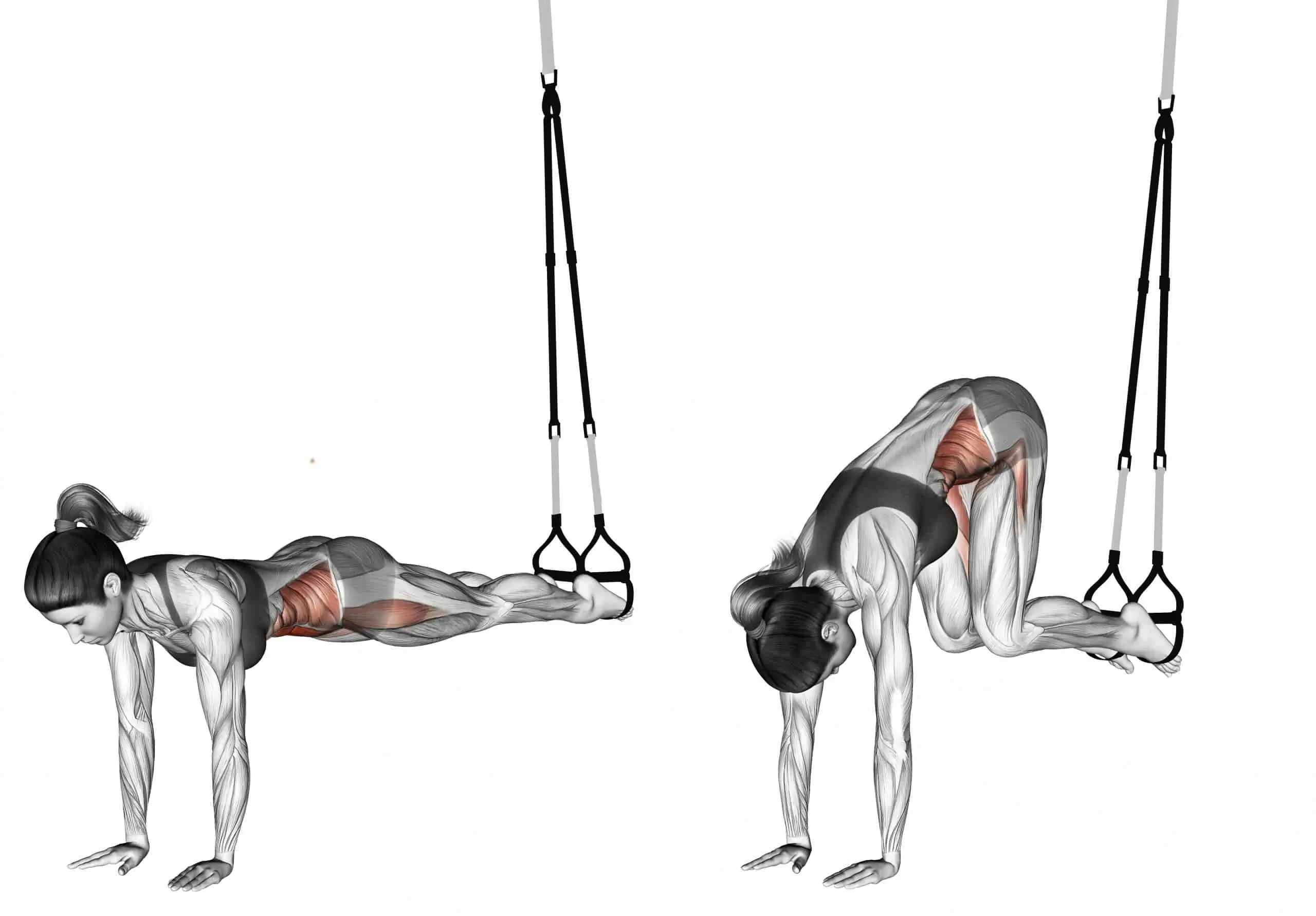
While not exclusively an ab workout device, suspension trainers offer unparalleled core engagement.
How it works:
- Creates instability that forces core stabilization
- Allows for progressive difficulty through body positioning
- Engages the entire core, including deep stabilizing muscles
Effectiveness rating: ★★★★★
Price range: $80-$200
Best for: All fitness levels (easily modifiable)
Top suspension trainer core exercises:
- Suspended planks
- Pike movements
- Knee tucks
- Fallouts
- Mountain climbers
3. Stability/Exercise Ball

This versatile ab workout device challenges your core through instability.
How it works:
- The unstable surface engages small stabilizing muscles
- Forces constant core engagement to maintain balance
- Allows for a wide range of exercise variations
Effectiveness rating: ★★★★☆
Price range: $15-$40
Best for: All fitness levels
Example stability ball exercises:
- Stability ball crunches
- Plank with feet on ball
- Pike rollouts
- Knee tucks
- Russian twists on ball
4. Medicine Ball
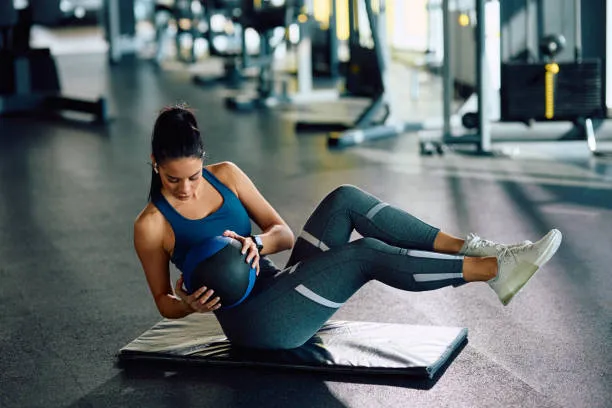
This weighted ball adds resistance to dynamic core movements.
How it works:
- Adds resistance to rotational movements that target obliques
- Enables explosive training for power development
- Allows progressive overload through weight increases
Effectiveness rating: ★★★★☆
Price range: $20-$60
Best for: All fitness levels, depending on weight chosen
Effective medicine ball exercises:
- Russian twists
- Slams
- Woodchops
- Seated twists
- Standing throws with partner
5. Cable Machine with Rope Attachment

While typically found in gyms rather than homes, this setup offers excellent core training.
How it works:
- Provides consistent tension throughout movement
- Enables rotational exercises critical for functional core strength
- Allows precise resistance adjustment
Effectiveness rating: ★★★★★
Price range: $1,000+ (home versions)
Best for: Intermediate to advanced users
Key cable machine core exercises:
- Cable crunches
- Woodchops (high to low, low to high)
- Pallof press
- Cable rotations
- Anti-rotation holds
Ab Workout Devices with Limited Effectiveness
Not all ab training equipment delivers meaningful results. These devices typically underperform despite their marketing claims:
1. Electronic Muscle Stimulation (EMS) Belts
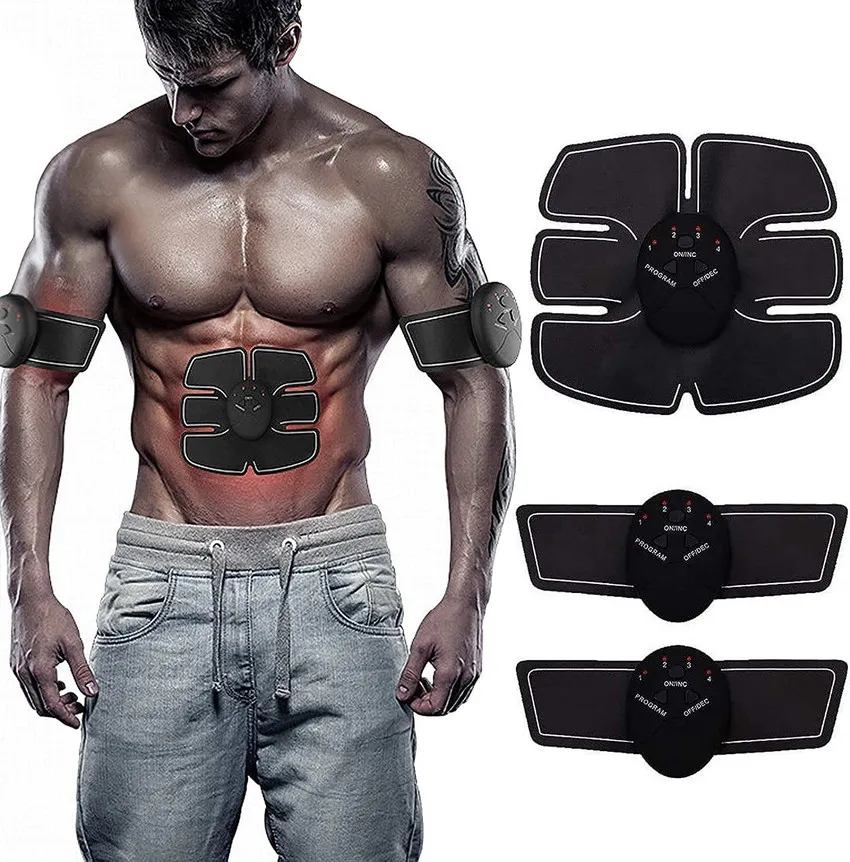
How they claim to work: Send electrical impulses to contract abdominal muscles passively.
The reality: While EMS has legitimate therapeutic applications, consumer ab belts:
- Produce only minimal muscle contractions
- Cannot replicate the intensity of actual exercise
- May tone muscles slightly but won’t build significant strength
- Show no evidence for reducing abdominal fat
Effectiveness rating: ★★☆☆☆
Better alternative: Ab roller or stability ball exercises
2. Ab Rockers/Ab Loungers
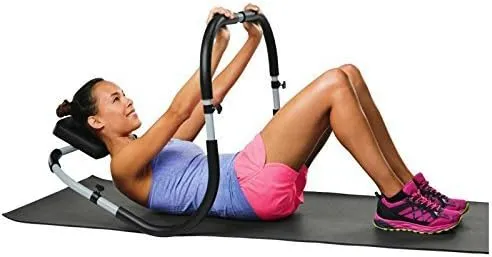
How they claim to work: Guide you through perfect crunch motion while supporting your neck.
The reality:
- Often restrict range of motion
- May encourage poor form
- Generally activate less muscle than basic floor exercises
- Typically less effective than simple bodyweight moves
Effectiveness rating: ★★☆☆☆
Better alternative: Decline bench exercises or stability ball crunches
How to Choose the Right Ab Workout Device
When selecting an ab workout device that will actually build core strength, consider these factors:
1. Your Current Fitness Level
| Fitness Level | Recommended Devices | Avoid |
| Beginner | Stability ball, Resistance bands | Ab roller (full version), Advanced cable exercises |
| Intermediate | Ab roller (modified), Medicine ball, Suspension trainer | Very high resistance without proper progression |
| Advanced | All devices with progressive overload | Devices that don’t allow sufficient challenge |
2. Your Specific Goals
For overall core strength: Prioritize devices that allow compound movements and progressive overload, like suspension trainers and ab rollers.
For sports performance: Focus on rotational tools like medicine balls and cable machines that develop power and multi-directional strength.
For rehabilitation: Consider gentle options like stability balls under professional guidance.
For visible abs: Remember that no device can spot-reduce fat—combine effective core training with overall fat loss strategies.
3. Available Space and Budget
- Limited space: Ab roller, resistance bands, doorway suspension trainer
- Medium space: Stability ball, medicine ball, foldable bench
- Larger space: Cable machine, comprehensive home gym system
- Tight budget: Ab roller (best value-to-effectiveness ratio)
Creating an Effective Ab Workout Routine with Devices
To get the best ab workout device results, follow these guidelines:
Frequency and Volume
- Train core 2-4 times per week
- Allow at least 24-48 hours recovery between direct core sessions
- Include 3-4 different exercises per session
- Perform 2-4 sets per exercise
- Aim for 8-15 repetitions for dynamic movements
- Hold isometric exercises for 20-60 seconds
Sample Routine Using Multiple Devices
Workout A (Monday/Thursday)
- Ab Roller Kneeling Rollouts: 3 sets of 8-12 reps
- Stability Ball Jackknives: 3 sets of 12-15 reps
- Cable Woodchops: 3 sets of 12 reps each side
- Plank Variations: 3 sets of 30-60 seconds
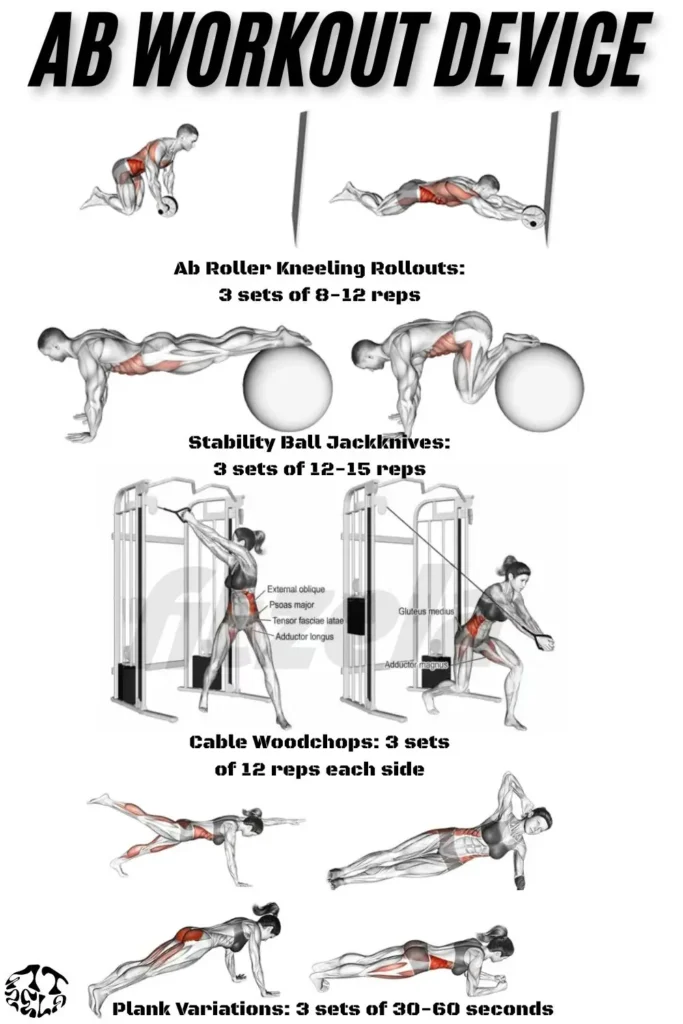
Workout B (Tuesday/Friday)
- Suspension Trainer Knee Tucks: 3 sets of 12-15 reps
- Medicine Ball Russian Twists: 3 sets of 20 reps
- Stability Ball Pike: 3 sets of 10-12 reps
- Side Plank Rotations: 3 sets of 8-10 each side
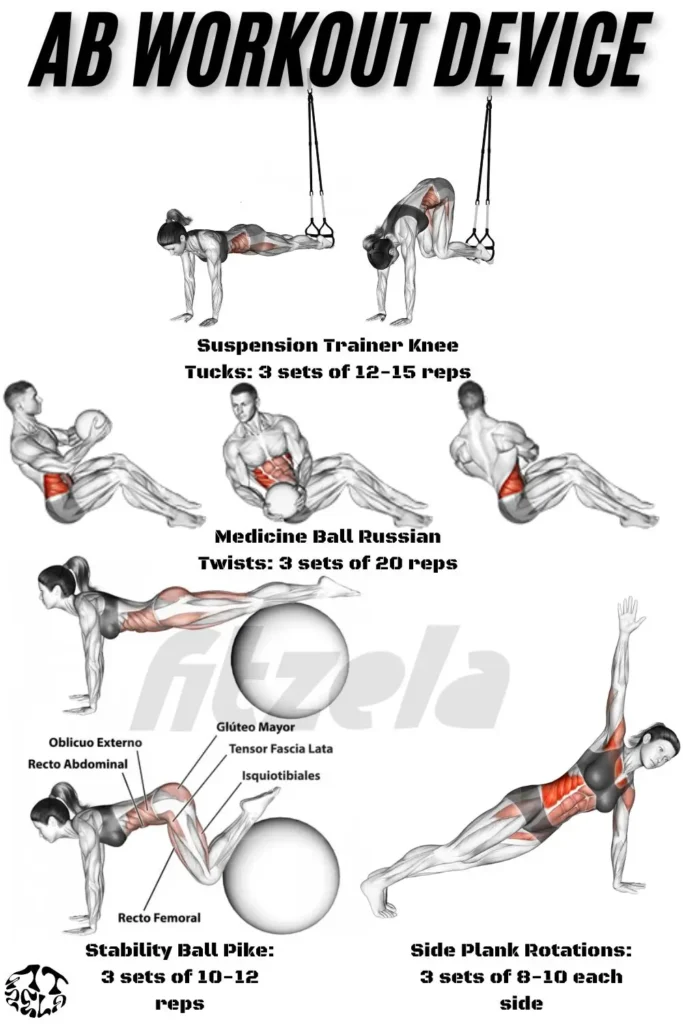
Progression Principles
To continue seeing results with any ab workout device:
- Increase resistance (heavier medicine ball, more challenging suspension trainer angle)
- Increase reps or time under tension
- Decrease stability (move feet wider apart on ab roller, use smaller stability ball)
- Increase range of motion (fuller extension on rollouts)
- Decrease rest periods between sets
Common Mistakes When Using Ab Workout Devices
Learning how to use an ab workout device correctly is crucial for both results and safety:
1. Relying Solely on the Device
Problem: Expecting the device alone to create defined abs. Solution: Combine device training with cardio and nutrition for fat loss, as visible abs require both strength and low body fat.
2. Using Momentum Instead of Muscle
Problem: Swinging, jerking, or using body weight to move through exercises. Solution: Slow down movements, focus on muscle contraction, and maintain control throughout the entire range of motion.
3. Training Only the “Six-Pack” Muscles
Problem: Focusing exclusively on the rectus abdominis with crunching motions. Solution: Include rotational and anti-rotation exercises that work obliques and transverse abdominis.
4. Neglecting Proper Form
Problem: Arching the lower back, pulling with the neck, or using improper alignment. Solution: Start with easier variations, focus on technique, and consider working with a trainer initially.
5. Overtraining the Abdominals
Problem: Doing hundreds of reps daily without recovery time. Solution: Train abs like any other muscle group with adequate intensity and recovery periods.
The Truth About Ab Workout Device Results
Setting realistic expectations about what ab workout devices can and cannot do is important:
What ab devices CAN do:
- Strengthen and tone core muscles
- Improve core stability and functional strength
- Enhance athletic performance
- Support better posture and reduce some types of back pain
- Contribute to the development of visible abs (when combined with proper nutrition)
What ab devices CANNOT do:
- Spot reduce fat from your midsection
- Create visible abs without addressing overall body fat percentage
- Replace a comprehensive fitness program
- Work effectively without proper technique and consistency
“The key to seeing your abs isn’t about finding the perfect device—it’s about consistent training with progressive overload combined with nutrition that supports fat loss.” – Mike Israetel, PhD, Sports Physiologist
Complementary Strategies for Core Development
For best results with any ab workout device:
Nutrition Support
- Maintain a slight caloric deficit if fat loss is a goal
- Ensure adequate protein intake (0.7-1g per pound of bodyweight)
- Stay hydrated to support performance and recovery
- Consider timing carbohydrates around workouts for energy
Functional Movement Training
Incorporate these exercises that indirectly strengthen the core:
- Squats
- Deadlifts
- Overhead presses
- Pushups
- Pull-ups
Recovery Practices
- Get 7-9 hours of quality sleep nightly
- Include active recovery days with light activity
- Consider foam rolling tight muscles that might affect core function
- Manage stress with meditation or other relaxation techniques
Conclusion: Choosing and Using Ab Workout Devices Effectively
The most effective ab workout devices are often the simplest—tools that challenge your core in functional ways and allow for progressive overload. The ab roller, suspension trainer, stability ball, medicine ball, and cable machine consistently prove their worth in research and practical application.
Remember that no device works without proper technique, consistency, and complementary nutrition strategies. By selecting the right ab workout device for your goals and fitness level and learning how to use it correctly, you’ll build functional core strength that translates to both performance benefits and aesthetic improvements.
Whether you’re a beginner or advanced fitness enthusiast, incorporating these proven tools into your training routine can help you develop a strong, functional core that serves you both in and out of the gym.


